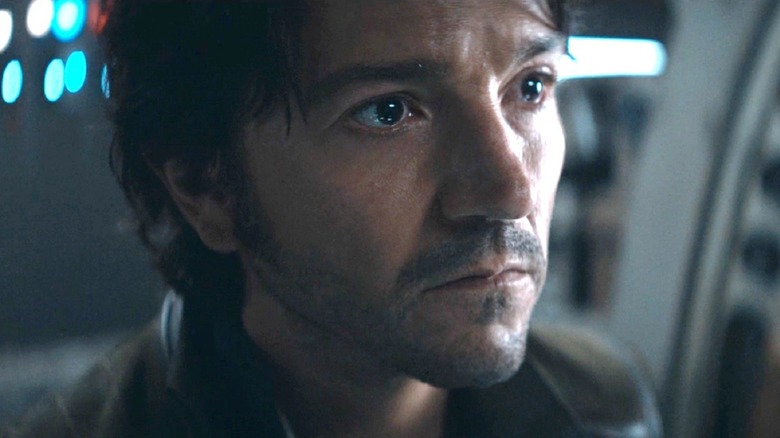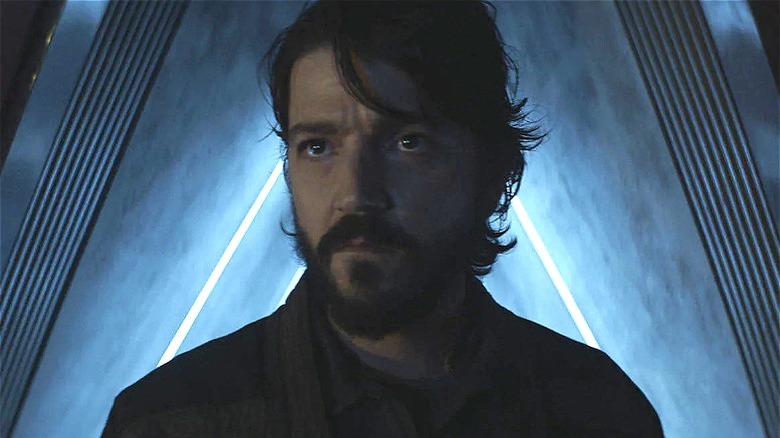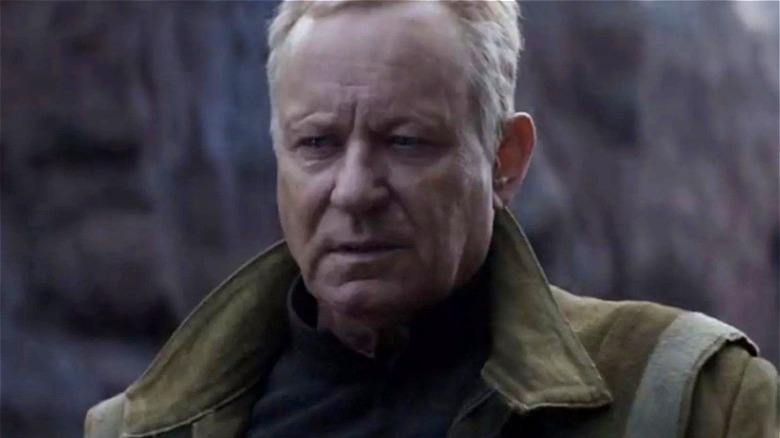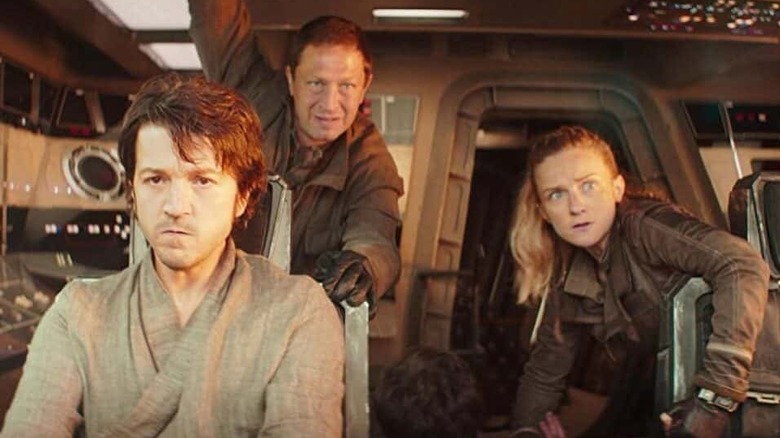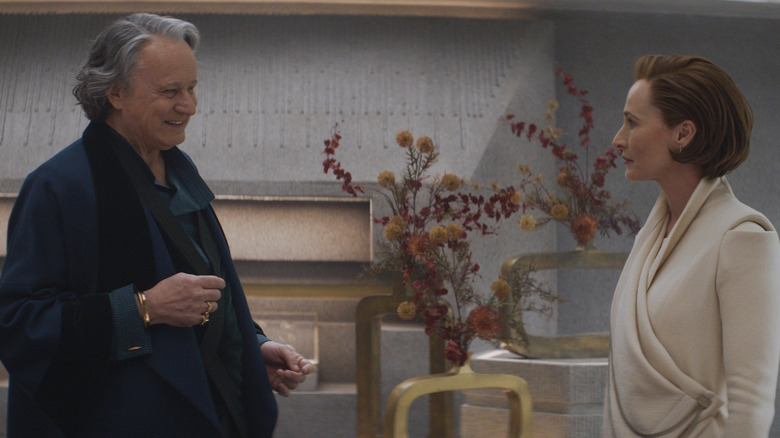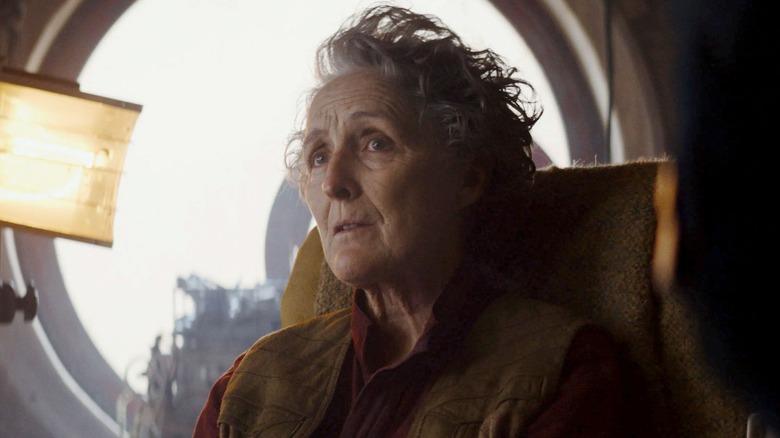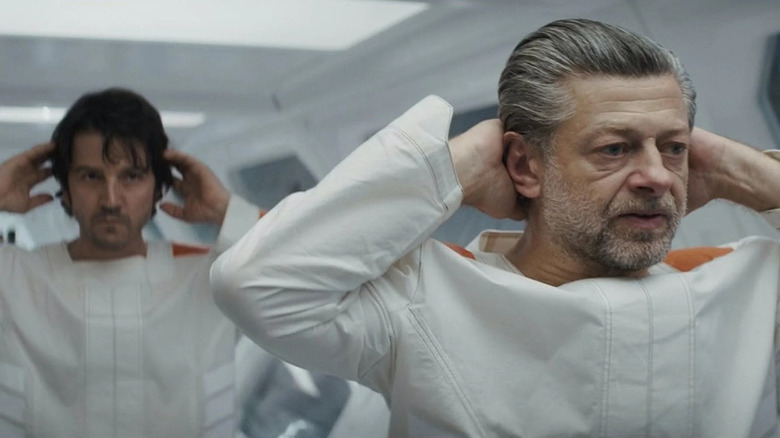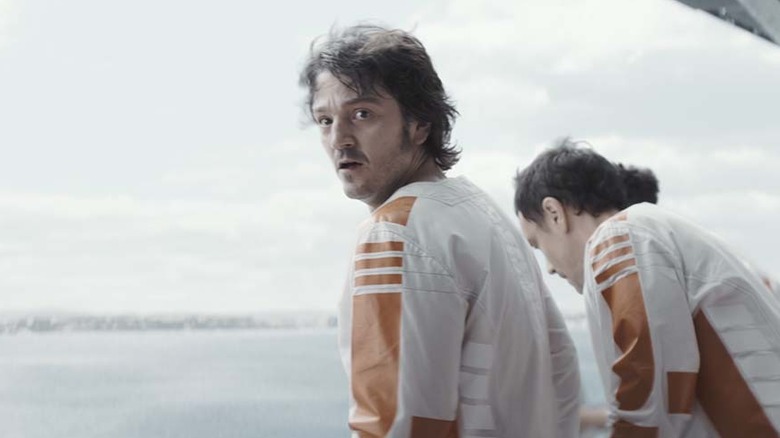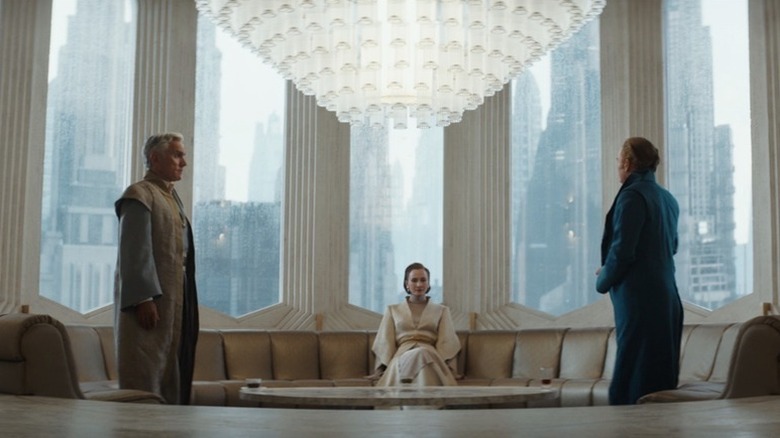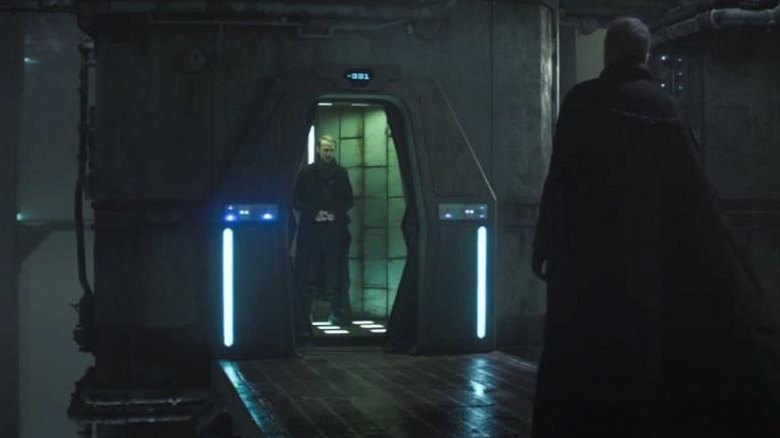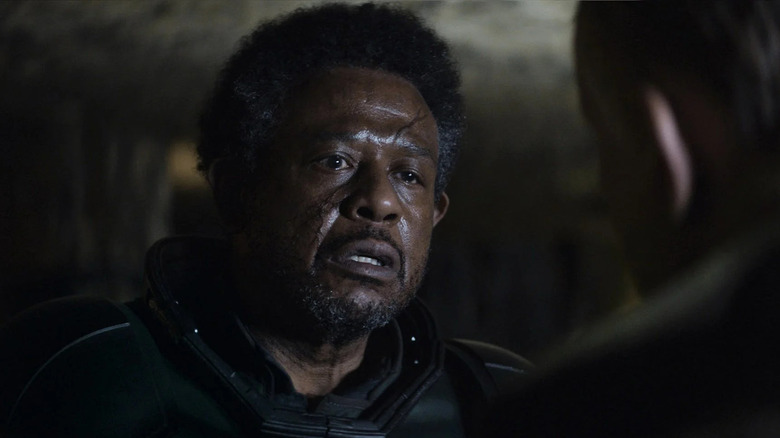Lines In Andor Season 1 That Mean More Than You Think
It's a near impossible task to narrow down the dialogue in "Andor" Season 1 to just a select list of meaningful quotes. The 12-episode Disney+ prequel series is perhaps the most intelligently written installment of "Star Wars" to date. True, the franchise isn't exactly known for strong writing. "Star Wars" became popular because of its classic hero's journey, its imaginative production design, and its broad sci-fi and fantasy appeal. Those elements are here, too, though everything's a bit more muted, nuanced, and mature compared to the rest of "Star Wars" canon... even more so than "Rogue One."
In short, "Andor" is noticeably more literary than your average galactic tale of good versus evil, which might be why it has struggled to find a typical "Star Wars" sized audience, despite the stellar reviews. But stick with Cassian's anti-hero journey and you'll see how cleverly "Andor" weaves itself into existing lore. Practically every line works in a literal capacity within the episode and as a reference to events and themes that run throughout the collected films, TV shows, and other media. These are some of the lines in "Andor" Season 1 that have more to say than the characters who say them might intend. Spoilers ahead.
You pay at the end
The premiere episode of "Andor" begins as the titular character and protagonist walks into what appears to be a space night club and brothel on Morlana One. He's scruffy and hardened, the type of person who might be at ease in such an establishment, until he opens his mouth. Two Pre-Mor Authority security officers sit on barstools nearby, there to partake in what the club offers. Andor, however, has come looking for his long lost sister. He attempts to procure information from one of the employees, but only gets so far. She tells him a girl who claimed to be from Kenari did work there a few months back, but that no one at the club uses their real name. Cassian accepts this and moves on; he'll use aliases himself at least twice in Season 1.
Of course, Morlana One is where the inciting incident of the series (and of Cassian's life as a rebel) takes place. He'll have little choice but to kill those two officers in self-defense, which alerts the Empire and the disorganized resistance movement to his presence. But before all that happens, Cassian has a seemingly meaningless exchange with the bartender. "You pay at the end," she tells him when she hands him a drink. On the surface, this means that — as the bouncer told him — credits aren't allowed inside. Patrons settle their bills on their way out. However, for anyone who's watched "Rogue One" and knows how Cassian's story concludes, this throwaway sentence (which is only the second line in the show) is actually a subtle instance of foreshadowing.
Just know it will always be worth more to me
Ever since the epic twist in "The Empire Strikes Back," "Star Wars" has been a franchise that invites fans to theorize, and that's most certainly true of "Andor." Instead of speculating about Rey's parentage or Snoke's identity, "Andor" encourages viewers to question the motives of all of its characters. Sure, we get the reveal that Vel is actually Mon Mothma's cousin, but most of the time, we're wondering if heroes, villains, or ordinary galactic citizens will turn.
One fan theory that has emerged in the wake of "Andor" Season 1 is that Luthen is a secret Force user. Potential evidence is abundant. He carries what looks like it could be the hilt of a lightsaber. His ship, a Fonder Haulcraft, is outfitted with red lasers that project from the sides, not unlike Darth Maul or the Grand Inquisitor's double sabers. He also stays remarkably calm under pressure, as if he's been trained by some higher order. In several scenes, he's cloaked and coded as a Sith. Luthen also remarks to Lonnie that he essentially joined the rebellion 15 years ago, or around the time of Order 66.
Perhaps the most telling clue so far is the blue kyber crystal (he also calls it a Sky Stone) that he gives to Andor as collateral in Episode 4. He tells him, should an emergency arise, he shouldn't sell it for less than 50,000 credits (Skeen later estimates its worth at 30,000 credits). Then he says, "Just know it will always be worth more to me." This implies it's either the kyber crystal from Luthen's own lightsaber, or it belonged to someone of great importance.
Climb!
Even single word quotes can be imbued with multiple layers of meaning. In Episode 6, "The Eye," Cassian (still going by Clem), Vel, Skeen, and Nemik make a daring escape from the Aldhani garrison. As Cassian takes off in a stolen aircraft, one of the heavy pallets crushes the idealistic Nemik. Imperial forces send three TIE fighters in pursuit. The dying rebel's final word to his comrades is: "Climb!"
While this episode is littered with ironic and tragic word choices (earlier, Cassian tells a nervous Nemik that he'll sleep when it's over), this relatively common utterance is particularly significant. In context, the injured Nemik is frantically yelling for Cassian to climb to a higher altitude so that they can evade the TIE fighters and complete their task as intended. During their training, the rebels ducked under passing TIEs that swooped down to intimidate them. At the time, Nemik shared some wisdom with Cassian. "Surprise from above is never as shocking as one from below." He means it literally and figuratively. So did K-2SO when he yelled this at Cassian and Jyn in "Rogue One." It was the droid's dying word, too. As is the case with Nemik, he didn't survive to see his mission succeed, but died with the hope that it might have.
The creators of "Andor" use up and down imagery throughout the series. There's the step ladder in the tower that Bix uses to radio Luthen. The Narkina 5 prisoners are told to climb in order to escape, after which Cassian and Melshi have to climb a rock face to continue their long trek to freedom.
Has anyone ever made a weapon that wasn't used?
Luthen Rael and Mon Mothma both lead double lives. The former is a long-time go-between for various resistance movements, as well as a high-class antiques dealer. The latter is a high-born Senator and an anti-Imperialist who's secretly funding the rebellion. The difference is, Luthen is keenly aware that he's really an insurrectionist leader. When he wears his wig and puts on an accent to sell expensive relics, it's 100 percent for cover. Mon Mothma, on the other hand, is (at least at the start of "Andor") far closer to the thing she's pretending to be. She's an affluent bleeding heart who the Empire sees as a novelty at best and a hypocrite at worst... for now.
Early on, Mothma has the luxury of not being taken too seriously, but when she brings news of Aldhani to Luthen (who she correctly guesses was responsible) in Episode 7, she admits she feels morally compromised to have been even tangentially involved. The antique salesman refuses to take credit or blame for the heist, but he explains the reasoning for it. Her money helped build a network that could eventually take down the Empire, but once their plan is set in motion, there is no turning back. Luthen reminds her that they'd already discussed this, then adds, "Has anyone ever made a weapon that wasn't used?"
Of course, Luthen is referring to the rebellion itself here, but it's hard not to think about the Death Star. Destroying it before it can be used becomes the whole point of Luthen's network by "Rogue One," and this line is a winking nod to that fact.
That's just love
In one of the most touching scenes from "Andor" Season 1, Cassian (with his pay from the Aldhani heist) tries to convince Maarva to flee Ferrix with him. At this juncture, he's still convinced the two of them could find peace somewhere else, despite the Empire's expansion and increased aggression. But his adopted mother refuses. Though Cassian insists what happened on Aldhani was "just a robbery," Maarva has been inspired by his act of defiance (and she doesn't even know for sure that it was him). "People are standing up," she says. She tells Cassian that she's been waiting around to die long enough and that she's willing to do whatever it takes to defeat her enemy. But she understands if he chooses a different path, and tells him he deserves peace if he can find it.
"I won't have peace. I'll be worried about you all the time," Cassian says. "That's just love," Maarva replies. "Nothing you can do about that." Though neither knows it for sure yet (both seem to suspect it), this is the last time mother and son will see each other. Their conversation mirrors a line from "WandaVision." A memory projection of Viz tells Wanda, "What is grief if not love persevering?" The idea that love is what separates the heroes from the villains is explored in "Star Wars," the MCU, and various other fantasy and sci-fi franchises. Rose identifies it as such in "The Last Jedi" when she tells Finn, "We're going to win this war not by fighting what we hate, but saving what we love." In a series with many morally gray characters, this sentiment makes all the difference.
Never more than 12
The appearance of Andy Serkis (who previously portrayed Snoke) as new character Kino Loy was a curious surprise for "Andor" viewers. The hard-driving but slightly empathetic day shift manager on level five was tough to figure out. He was a prisoner, like his charges, but he was also a rule follower who seemed to have bought into Narkina 5's system. While other captive workers readily gossip about what's happening on other levels, Kino is content to stay quiet, count his remaining days, and keep his assembly line moving. He doesn't out Cassian when he asks for information about the internal workings of the prison, but he doesn't provide intel either. That is, until the end of Episode 9, "Nobody's Listening," when he realizes that there is no getting out. Cassian asks him one last time, "How many guards are on each level?" "Never more than 12," Kino says quietly but with resolve.
The line is useful. Armed with this information, the level five prisoners are able to overtake the guards and eventually the entire prison. It's also symbolic. Kino doesn't have to verbally swear allegiance to Cassian; the number itself is proof he's chosen a side. This quote harkens back to the beginning of the season as well, when Syril and his sergeant are plotting to ambush Cassian upon his return to Ferrix. They agree that they should send 12 officers, just to be safe. The notion that the Empire underestimates its necessary defenses, both in terms of boots on the ground and its overall presence in the galaxy, is a repeated motif in "Andor."
One way out!
Episode 10 is titled "One Way Out." The phrase is chanted over and over again as a rallying cry from the moment the prisoners decide to fight back to the moment they jump (or fall) to, if not safety, then freedom. These words can be interpreted in several ways. First, Cassian and Kino come to understand and share the unfortunate news with their fellow prisoners that there is no getting out of Narkina 5 at the end of one's sentence. The only way out is escape. Once they set their plan into action, overpowering the guards when Ulaf's replacement is brought in and disabling the security measures, the only way out is up. The rebelling prisoners have to race to the top level of the facility, where there is only one way out of the building.
"One way out" is also an anthem of rebellion and cooperation. "You need to help each other," Kino instructs the men. "If we can fight half as hard as we've been working, we'll be home in no time." Of course, we know that's not true for Kino. That one way out involves jumping into the sea. One of the most heartbreaking moments in Season 1 comes when Kino stands a few feet back from the ledge and confesses to Cassian that he can't swim. Whether he knew they had to swim the whole time and selflessly led everyone to freedom anyway, or he realized it only when he saw freedom just out of reach is ambiguous. In terms of rebellion, "one way out" is an acknowledgement that fighting back against the tightening fist of the Empire is the only chance those who survive the jump will have at true autonomy.
A drop of discomfort might be the price of doing business
Though Episode 10 is mostly about the harrowing prison break, Mon Mothma faces a harrowing ordeal of her own. With her old friend (and perhaps love interest) Tay's help, she arranges a meeting with a powerful but crooked businessman named Davo Sculdun. She's uneasy enough at having to ask this person to intervene in her financial affairs, but she believes she can keep their relationship strictly professional. However, Davo doesn't want to be paid off for his services. He has plenty of money, he assures her. Mon protests as diplomatically as possible. "Please take no offense," she offers. "I'd prefer not to owe any favors. I'd feel far more comfortable paying you for your trouble." Davo replies, "A drop of discomfort might be the price of doing business."
In return for his cooperation in laundering her family fortune, Davo wants a Chandrilan arranged marriage between Mon's teenage daughter and his teenage son. We can assume that this would lend the white collar crime lord legitimacy. For now, Mon refuses, but it's clear by the next episode that she has no alternative. Davo knows this and is forcing Mon to see that breaking laws — even unjust ones — requires getting one's hands dirty. Based on her own unhappy marriage, we can guess that Mon wanted to avoid a similar fate for her daughter Leida (for her part, the uber traditional Leida seems happy to oblige). But Davo's advice to Mon applies to more than their dealings. The senator is beginning to see that, in the coming war, her wealth and status won't protect her from having to make sacrifices and take risks.
I'm condemned to use the tools of my enemy to defeat them
Episode 10 — one of the standouts of the first season — ends with an all-time great "Star Wars" speech delivered by Luthen to Lonnie, a rebel spy who wants out following the birth of his first child. When Luthen makes it plain that Lonnie will not be quitting, the double agent asks what he's ever sacrificed for the movement. Luthen responds with: "Calm. Kindness. Kinship. Love. I've given up all chance at inner peace. I've made my mind a sunless space. I share my dreams with ghosts. I wake up every day to an equation I wrote 15 years ago from which there's only one conclusion. I'm damned for what I do." He continues: "What is my sacrifice? I'm condemned to use the tools of my enemy to defeat them."
Luthen's impassioned answer can be read three ways. He wants Lonnie to see that he's sacrificed everything for the rebellion... everything meaning any chance at happiness, normality, or even a clean conscience. Luthen is also speaking about the rebellion at large. They're forced to resort to tactics — dishonesty, theft, murder — that they don't agree with and wouldn't employ in peace time. They only have the idea that the ends justify their means, because their behavior isn't any better than the ISP's. But Luthen could also be admitting (to the audience, if not Lonnie) that he's a Force user who tapped into the dark side. If he was indeed a Jedi, the tools of his enemy could mean the teachings of the Sith.
Let's call it war
Things come to a head in Episode 11 and Episode 12, which are full of more consequential and flawlessly written lines than viewers can realistically keep track of. There's Leida and her friends' ominous recitations. There's Nemik's manifesto. There's Maarva's rousing posthumous call to battle. Luthen and Saw Gerrera's chat might not be the most emotionally affecting, and it doesn't boast the most spectacular turns of phrase, but it sets the rest of the series on its collision course with the events of "Rogue One."
In an effort to bring together the fractured rebellion, Luthen gives Saw the final say on whether to send Kreegyr and his men to their certain deaths, so as to keep their spies secret. Saw struggles with the decision at first, in no small part because he wonders if Luthen would trade his life just as easily. The two rebel leaders discuss the matter dispassionately. For the rebellion to keep a strategic advantage, fifty men plus Kreegyr will die. That Luthen repeatedly separates Kreegyr from the rest of the equation is an admission that some lives are worth more than others in war. It's this fact that convinces Saw to stay the course. "For the greater good," he says. "Call it what you will," Luthen replies. Saw gets the last word. "Let's call it war."
This is huge because it marks the moment that what we think of as the star wars begin. In the finale, Kreegyr and his men are lost, and Maarva compels the citizens of Ferrix to fire the opening shots. It all kicks off, and things are set in motion that cannot be undone.
